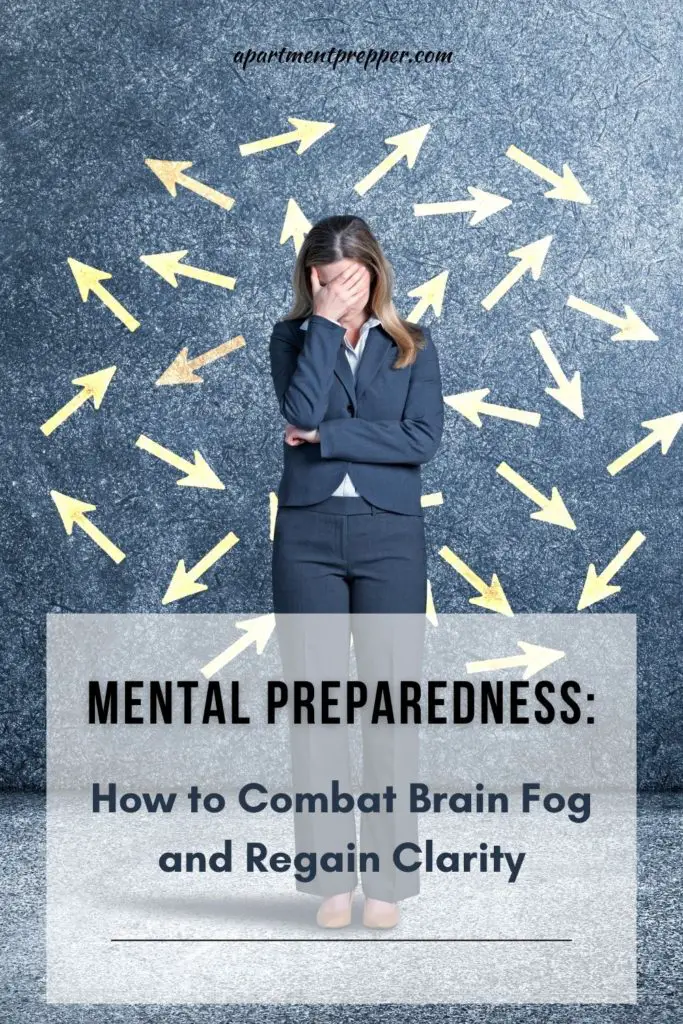Written by Bernie Carr
In an emergency, you’ll need your wits about you. Fast thinking can save your life. Unfortunately, multitasking and information overload have become the norm in our fast paced world, and a lot of people often find themselves struggling with a phenomenon known as “brain fog.” Brain fog can be described as a state of mental cloudiness or confusion, where individuals experience difficulties in concentration, memory recall, and overall cognitive functioning. Brain fog can prevent you from acting decisively and appropriately in a high stress situation. Fortunately, with the right strategies and mental preparedness, you can combat brain fog and regain mental clarity. In this article, we will explore what brain fog is, why it happens, and provide practical tips to overcome it effectively.
What is brain fog?
Brain fog is not a specific medical condition but rather a variety of symptoms that can stem from several factors. It is commonly characterized by a feeling of mental fatigue, lack of focus, forgetfulness, and overall reduced cognitive performance. If you are experiencing brain fog you may find it challenging to concentrate, make decisions, and engage in complex mental tasks.
Causes of Brain Fog
Several factors contribute to the occurrence of brain fog. Some common causes include:
- Sleep Deprivation: Inadequate sleep or poor sleep quality can directly impact cognitive function and lead to brain fog.
- Stress and Anxiety: Chronic stress or high levels of anxiety can overload the brain with cortisol, impairing cognitive processes.
- Nutritional Imbalances: Poor diet, nutrient deficiencies, or blood sugar fluctuations can affect brain function and contribute to brain fog.
- Sedentary Lifestyle: Lack of physical activity can lead to poor blood circulation, limiting oxygen and nutrient supply to the brain.
- Medications and Medical Conditions: Certain medications and health conditions, such as fibromyalgia, thyroid disorders, or chronic fatigue syndrome, can induce brain fog as a side effect.
How does brain fog impact your actions in an emergency?
Brain fog can significantly hinder a person’s ability to take prompt and effective action in an emergency situation. Here’s how brain fog can prevent action in such scenarios:
- Impaired Decision-Making: Brain fog can impair cognitive processes, making it difficult to think clearly and make quick decisions. During an emergency, time is of the essence, and individuals experiencing brain fog may struggle to assess the situation, evaluate available options, and make critical decisions promptly.
- Reduced Focus and Attention: Brain fog often leads to a lack of focus and poor attention span. In emergency situations, it is crucial to concentrate on the task at hand and pay attention to important details. Brain fog can make it challenging to filter out distractions and stay fully engaged, thereby impeding swift and accurate action.
- Slowed Information Processing: Brain fog can slow down information processing, causing delays in understanding and responding to the emergency situation. Individuals may find it difficult to absorb and comprehend information quickly, which can hinder their ability to take appropriate action in a timely manner.
- Memory Impairment: Brain fog can negatively impact memory recall, making it difficult to remember crucial information, such as emergency protocols, escape routes, or contact numbers. This memory impairment can further delay response time and prevent individuals from executing necessary actions effectively.
- Lack of Energy and Motivation: Brain fog often accompanies mental fatigue and low energy levels. In emergency situations that require physical exertion and mental alertness, individuals experiencing brain fog may struggle to find the energy and motivation needed to take immediate action. This can result in delayed or inadequate response to the emergency.
It is important to note that brain fog affects individuals differently, and the severity of its impact can vary. However, in any emergency situation, it is crucial for individuals to recognize the presence of brain fog and take steps to mitigate its effects to the best of their abilities. This may involve seeking assistance from others, relying on emergency protocols and procedures, and holding drills in advance to compensate for any potential cognitive impairments during such situations.
How to overcome brain fog
Now, let’s explore some effective strategies to combat brain fog and improve mental preparedness:
- Prioritize Quality Sleep: Ensure you get 7-9 hours of uninterrupted sleep each night. Create a calming bedtime routine and maintain a consistent sleep schedule.
- Reduce Stress Levels: Incorporate stress-reducing practices like meditation, deep breathing exercises, or yoga into your daily routine. Engage in activities that bring you joy and promote relaxation.
- Adopt a Brain-Boosting Diet: Consume a well-balanced diet rich in antioxidants, omega-3 fatty acids, and vitamins. Include fruits, vegetables, whole grains, lean proteins, and healthy fats in your meals. Limit your intake of processed foods, refined sugars, and caffeine.
- Stay Hydrated: Dehydration can contribute to brain fog, so make sure to drink an adequate amount of water throughout the day.
- Regular Exercise: Engage in regular physical activity to improve blood circulation and oxygen supply to the brain. Aim for at least 30 minutes of moderate-intensity exercise most days of the week.
- Mental Stimulation: Challenge your brain regularly with activities like puzzles, reading, learning new skills, or playing brain games. This helps improve cognitive function and mental agility.
- Practice Mindfulness: Incorporate mindfulness techniques into your daily routine. Practice being fully present in the moment, which can help reduce mental clutter and enhance focus.
- Seek Support: If brain fog persists or significantly affects your daily life, consider seeking professional help. A healthcare provider can identify any underlying medical conditions or prescribe appropriate treatments.
Conclusion
Brain fog can be a frustrating experience, but with a proactive approach and mental preparedness, you can combat it effectively. You really would not want to be having brain fog when you are in the middle of an emergency or a disaster. By implementing strategies such as prioritizing quality sleep, managing stress levels, maintaining a brain-boosting diet, and engaging in regular physical and mental exercises, you can improve your cognitive function, enhance focus, and regain mental clarity. Everyone is different, so be patient with yourself and find what works best for you. Try these strategies, and you’ll be well on your way to combating brain fog and achieving optimal mental preparedness.
Today’s societal climate not supportive of prepping. With your help, we can keep bringing you content that is often suppressed. Help keep Apartment Prepper alive.
Join me on Patreon for ad-free content.
Or Help out via Paypal
About the author
Bernie Carr is the founder of Apartment Prepper. She has written several books including the best-selling Prepper’s Pocket Guide, Jake and Miller’s Big Adventure, The Penny-Pinching Prepper and How to Prepare for Most Emergencies on a $50 a Month Budget. Bernie’s latest e-book, FRUGAL DIY has just been released on Amazon. Her work appears in sites such as the Allstate Blog and Clark.com, as well as print magazines such as Backwoods Survival Guide and Prepper Survival Guide. She has been featured in national publications such as Fox Business and Popular Mechanics. Learn more about Bernie here.
FB: https://www.facebook.com/apartmentprepper
Instagram: https://www.instagram.com/apartmentpreppers/
Twitter: https://twitter.com/AptPrepper
YouTube: https://www.youtube.com/channel/UC7vOtdbo-wiBeBxD6puCr1Q
Patreon: https://patreon.com/apartmentprepper
Pinterest: https://www.pinterest.com/aptprepper/




